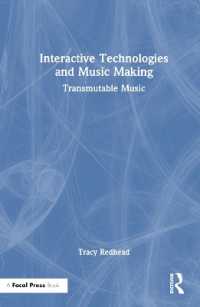- ホーム
- > 洋書
- > 英文書
- > History / World
Full Description
Nigeria is famous for "419" e-mails asking recipients for bank account information and for scandals involving the disappearance of billions of dollars from government coffers. Corruption permeates even minor official interactions, from traffic control to university admissions. In Moral Economies of Corruption Steven Pierce provides a cultural history of the last 150 years of corruption in Nigeria as a case study for considering how corruption plays an important role in the processes of political change in all states. He suggests that corruption is best understood in Nigeria, as well as in all other nations, as a culturally contingent set of political discourses and historically embedded practices. The best solution to combatting Nigerian government corruption, Pierce contends, is not through attempts to prevent officials from diverting public revenue to self-interested ends, but to ask how public ends can be served by accommodating Nigeria's history of patronage as a fundamental political principle.
Contents
Acknowledgments ix
Introduction: Corruption Discourse and the Performance of Politics 1
Part I. From Caliphate to Federal Republic
1. A Tale of Two Emirs: Colonialism and Bureaucratizing Emirates, 1900-1948 27
2. The Political Time: Ethnicity and Violence, 1948-1970 63
3. Oil and the "Army Arrangement": Corruption and the Petro-State, 1970-1999 105
Part II. Corruption, Nigeria, and the Moral Imagination
4. Moral Economies of Corruption 153
5. Nigerian Corruption and the Limits of the State 188
Conclusion 219
Notes 231
Bibliography 257
Index 277








